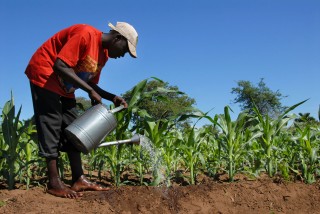Over 1 million small-scale farmers in Chad are set to benefit from an €81.9 million project funded by the International Fund for Agricultural Development (IFAD) and partners.
The project, Strengthening Productivity and Resilience of Agropastoral Family Farms Project (RePER) is aimed at helping vulnerable small-scale farmers to boost their income and food security. It would also help liberate the country’s drought-stricken agricultural sector and create alternatives for the rain-fed farming practices currently in use.
The project was flagged off at a workshop which had IFAD members, government officials, participants and stakeholders present. It was opened by Gayang Souaré, Minister of Livestock and Animal Productions of the Republic of Chad, and Valantine Achancho, IFAD Country Director for Chad.
“The government expresses its satisfaction with the satisfactory results recorded by the PADER-G completed in 2017 and the ongoing Project to Improve the Resilience of Agricultural Systems (PARSAT),” Souaré said during the RePER flag off workshop.
He added that the government has decided to partner with IFAD on the RePER project to boost its agro-silvo-pastoral resilience based on the success of PADER-G.
RePER includes a €49.3 million grant and loan of €5.3 million from IFAD, as well as co-financing from the Green Climate Fund grant (€17.1 million), the Government of Chad (€7.6 million) and by the beneficiaries themselves (€2.6 million).
For RePER to be a success, the Chadians need to be fully committed to its plans. Achancho in his speech said that “it is not the development projects that make the development of a country. It is the men and women, the committed beneficiaries who are the actors of their own development.”
He further added that “projects are only catalysts, tools for supporting national policies and strategies for the implementation of operational action plans.”
The RePER project seeks to raise the performance and resilience of agropastoral family farms by strengthening agricultural water infrastructure, rehabilitate rural feeder roads, intensify and diversify family farming production systems. It also seeks to support value addition for agropastoral products, improve nutrition, improve adult literacy, support farmers’ organizations and improve access to financial services.
Despite certain economic challenges, Chad’s agricultural sector offers significant development opportunities for smallholder farmers.
The country, whose economy was undermined in 2015 by falling oil prices, is largely an agro-economy. In 2006, approximately 80 percent of Chad’s labour force was employed in the agricultural sector. This sector of the economy accounted for almost half of the GDP. With the exception of cotton production, small-scale sugar cane production, and a portion of the peanut crop, Chad’s agriculture still remains largely subsistence-based.
IFAD has been actively involved in rural development programs and projects in Chad since 1992; benefitting about 294,350 rural households.
By Ishioma Emi








